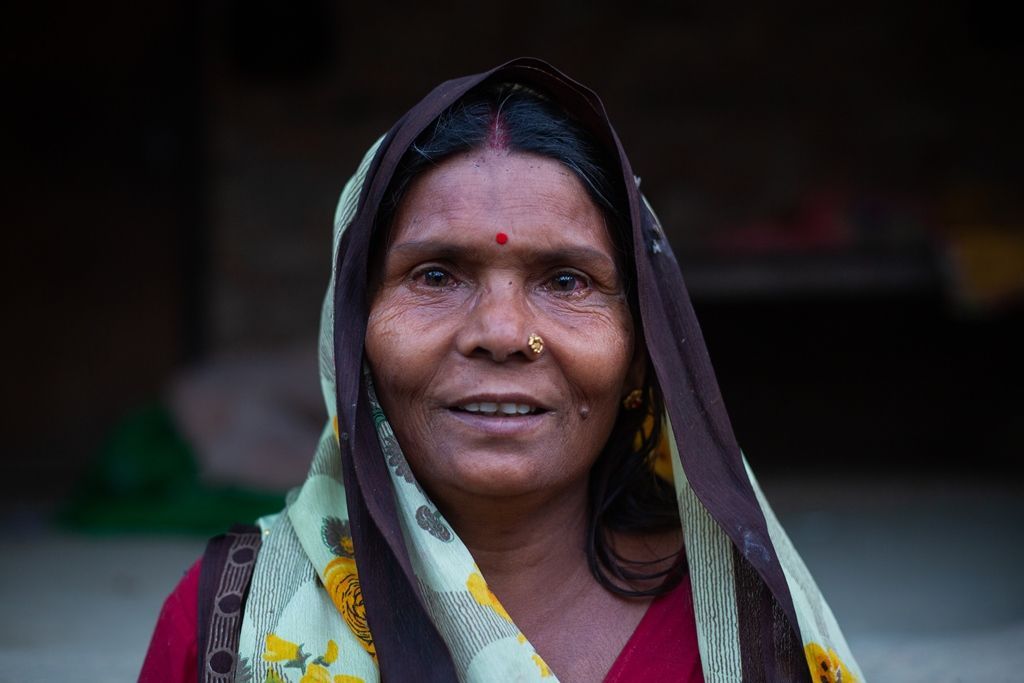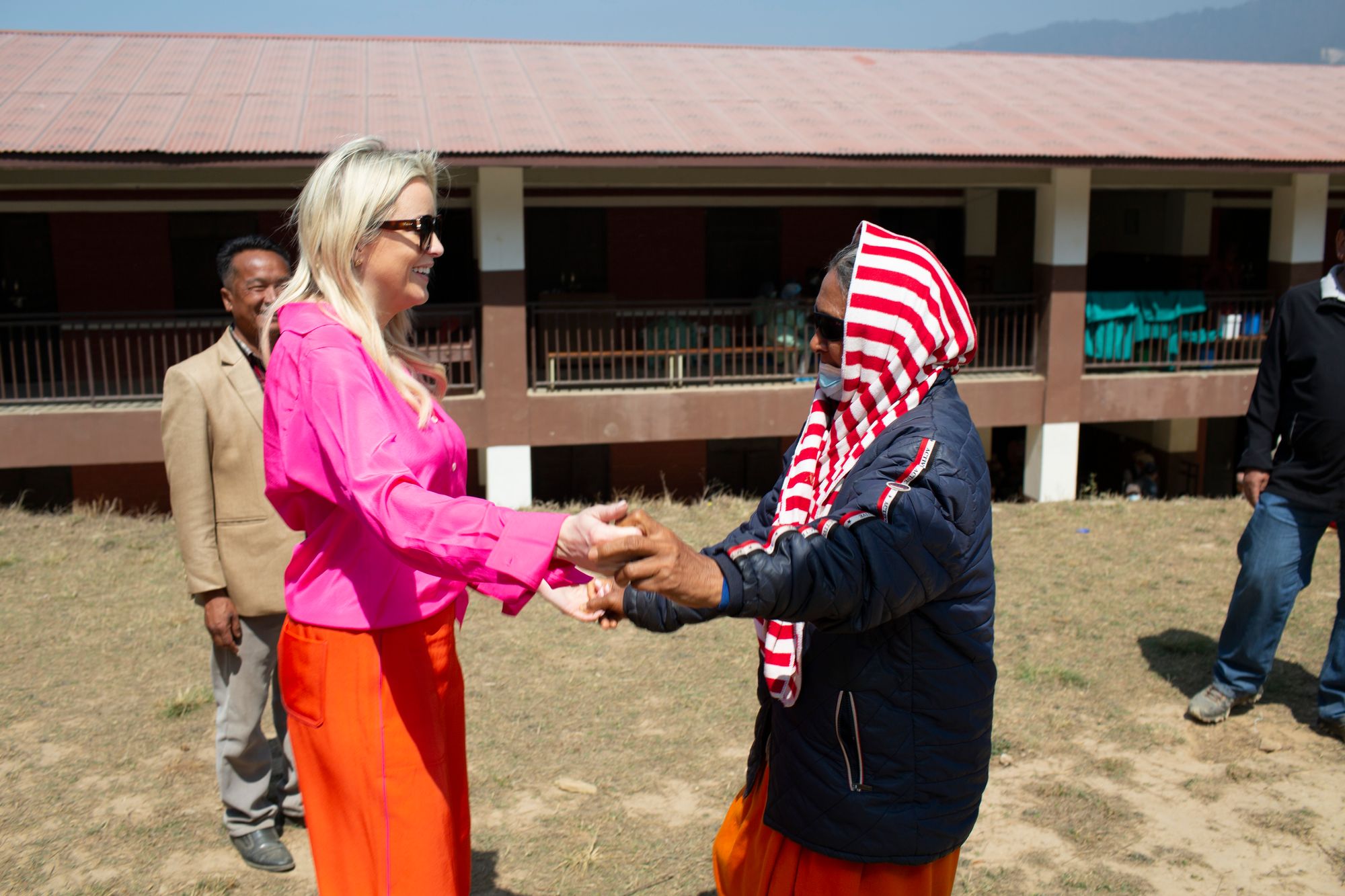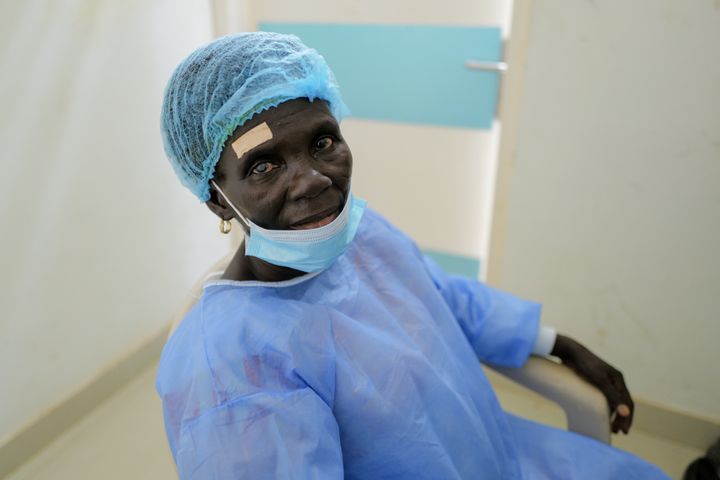London philanthropist aims to cure poverty-related blindness worldwide

London philanthropist Tej Kohli is funding large-scale pioneering research and treatment programs for conditions that cause sight loss.
By Jane Bird
Tej Kohli has united with Dr Sanduk Ruit in a global mission to combat needless cataract blindness in poor and underserved communities. Together they aim to build a lasting legacy of social and economic change.
Murathi Parsi experienced the first signs of cataracts when she had a headache and collapsed while working in a Nepalese field almost three years ago. “In the days that passed I remember losing my sight rapidly,” she says. At her lowest point, she could only make out hazy figures moving around her.
Murathi became dependent upon her family for basic care — often delaying her grandchildren’s departure for school or causing her husband to forfeit a day’s wages. Sometimes local dogs would take food from her plate.
But earlier this year her vision was restored in a 15-minute operation performed at a microsurgical “cataract camp” in Lumbini – a 90-minute cycle ride from her home. Murathi was stunned by how swiftly and clearly she could see when her bandages were removed.
The inaugural cataract microsurgical outreach camp of the Tej Kohli & Ruit Foundation at the birthplace of Buddha in Nepal, March 2021.
The outreach camp was the result of a partnership between London philanthropist Tej Kohli and Dr. Sanduk Ruit, Nepal’s “God of Sight”. Dr. Ruit pioneered a simple technique in 1984, which involves removing the cataract without stitches through small incisions and replacing them with a low-cost artificial lens.
He and Tej Kohli have set up the Tej Kohli & Ruit Foundation (TKRF), which aims to deploy cataract camps to screen 2m people by 2026 and cure 300,000 to 500,000 of blindness or severe visual impairment. At Lumbini, 900 patients were screened in three days and nearly 400 operations were performed. Among them was also 14-year-old Bipana Rai, who was born visually impaired due to congenital cataracts. Cheerful by nature, she had nevertheless been worried that her worsening cataracts were going to harm her ongoing education. Thanks to her restored sight, she says: “I will now be able to study and do my homework without difficulty.”
14-year-old Bipani has her bandages removed by the Tej Kohli & Ruit Foundation team after being cured of cataract blindness in March 2021.
Tej Kohli, an engineer, entrepreneur, and 62-year-old father of two, has pledged to use his self-created wealth for the world’s good, changing lives through support for large-scale technological and medical innovations. This ranges from Covid-19 vaccine development in the US to free bionic arms for disabled young people in the UK, food for underprivileged children in Costa Rica, and participation in the fight against holiday hunger in the UK.
It also includes the Tej Kohli Cornea Institute in Hyderabad, launched in 2015 to focus on corneal blindness research and treatment. By the end of 2019, the Institute had completed 43,255 free surgical procedures to cure and alleviate blindness in poor and remote communities in India. It is playing a key role in helping to achieve Tej Kohli’s goal of eradicating corneal blindness by 2035. The Institute is also researching new techniques such as big data and AI to try to determine which communities to target and how to triage patients.
The Tej Kohli Cornea Institute welcomed over 223,404 outpatients between 2015 and the end of 2019.
Meanwhile, Tej Kohli is backing a number of other technology-driven research projects to cure blindness, from biosynthetic to molecular approaches such as nanostring and DNA hybridization.
Such projects are crucially important in the developing world where the impact of blindness can be devastating. It often robs people of their livelihoods and independence while burdening family members, in particular young girls, forcing them to withdraw from education. Yet poverty-induced blindness is a low priority for charities, NGOs, and governments because it is not immediately life-threatening.
Dr. Ruit has fought cataract blindness for more than three decades. “I was aware of Tej Kohli’s good work in corneal blindness,” he says. “Hence, I was delighted when he and his team approached me to look at the possibility of joining hands in a fight against cataract blindness. Our vision and ideas were similar and I am inspired by his enthusiasm to help those in need.
The Tej Kohli & Ruit Foundation outreach camps combine Dr. Ruit’s technical expertise for delivering large-scale low-cost cataract surgeries with Tej Kohli’s experience of funding grassroots projects worldwide. There is great potential to extend the camps globally, Dr. Ruit says.

“Cataract surgery has been made to be simple, predictable, and affordable even at the community level. In spite of this, about 70m people who need surgery cannot get it.”
Cataract surgery is one of the most cost-effective medical interventions, Dr. Ruit says. “The success of setting up effective cataract surgical delivery models in Nepal and elsewhere demanded to be scaled up,” he adds. “We needed somebody with passionate business philanthropy to help us achieve this. Tej Kohli and his vision matched very well with ours. This was what motivated us to join forces with him.”
The goal of Tej Kohli and Dr. Ruit is to make cataract surgery in Nepal affordable and accessible to all and to scale it up to other parts of the world including Northern India, Indonesia, Myanmar, Bangladesh, North Korea, Afghanistan, Rwanda, Tanzania, Lebanon, and Syria. “Training local doctors and technicians and leaving a legacy of newly-established community eye hospitals is a crucial part of our mission to achieve sustainability,” Dr. Ruit says.
The direct effect of sight restoration has tremendous value to patients, their family, and their country, says Dr. Ruit. “This will help in social transformation, economic authority, and increase in life expectancy.”
Meanwhile, Tej Kohli is continuing his focus on corneal blindness — a condition that accounts for 7 percent of the world’s blind according to the World Health Organisation. Corneal opacities are the third most common cause of blindness.
Up to three-quarters of cases can be cured by corneal transplants but worldwide fewer than one in 70 sufferers receive these each year because donors are scarce, synthetic corneas are expensive, and transplants are invasive and require skilled surgery.
Cornea surgeon Dr. May Griffiths, Professor at the Department of Ophthalmology, University of Montreal, says: “To date, an estimated 12.7m people are awaiting corneal transplantation with human donor corneas from eye banks. There is a severe shortage of donor tissue in most countries and to top it off, many other patients in about 53 percent of countries around the world have no access to eye banks or transplantation.” Patients with inflammation or severe disease are not amenable to conventional transplantation, she says. “So another solution is needed.”
In 2019, Tej Kohli gave $2m to Massachusetts Eye and Ear (MEE), a teaching hospital of Harvard Medical School, to fund technological innovations to cure corneal blindness. The MEE’s Department of Ophthalmology is the world’s largest vision research and clinical enterprise. Its head, Professor Joan Miller, says: “We share a passion and collective mission with Tej Kohli to eradicate corneal blindness worldwide. We admired Tej’s longstanding and continued commitment to this mission. By funding innovative research programs at Mass Eye and Ear and also with our international research partners at LV Prasad Eye Institute in India, we hope to accelerate our progress to this goal — to bring better care and treatments to the world’s population.”
The researchers whose work has been funded by the Tej Kohli Cornea Program are pursuing three primary pathways to achieve the goal of curing corneal blindness: Prevention, treatment, and regeneration.
The Tej Kohli Cornea Program at Massachusetts Eye And Ear is funding technological innovations to cure corneal blindness.
The commonest cause of corneal blindness worldwide is infection leading to corneal perforation. Inflammation at the site of a corneal ulcer can often lead to tissue loss and perforation of the eyewall. Perforation can allow infection to get into the eye, leading to blindness.
Traditional treatment involves potentially toxic therapies such as the application of cyanide glue — as used in building model aeroplanes – which does not promote tissue regeneration once the infection has been treated. The alternative is a complex and expensive surgery, which can make the cornea more susceptible to scarring or infection. Other causes of corneal damage include chemical burns, immune conditions, and physical injury.
The MEE team wanted to address the problem by developing a clear, transparent, adhesive that could become part of the cornea and permit corneal cells to grow into it, and become one with the biomaterial.
It has achieved this with the production of GelCORE, says Reza Dana, Claes H. Dohlman, Professor of Opthalmology at Harvard Medical School. GelCORE is an adhesive biomaterial for replacing corneal tissue, which comes in a bottle and can be administered to the eye with a dropper. On exposure to light, it forms a collagen crust and which can be fine-tuned for its degree of firmness and other mechanical properties. There is no need for stitches and over time the material keeps the cornea intact, meshing and integrating with the corneal tissue.
The Tej Kohli Cornea Program at Massachusetts Eye And Ear is supporting the development of ‘GelCORE’, an adhesive biomaterial technology.
Speaking on YouTube, Professor Dana says that this is far less risky than removing a big chunk of the cornea, applying a corneal transplant, and then having that patient be at risk of a rejection process for the rest of their lives. “In addition, we want this biomaterial to be potentially a source for eluding drugs. Growth factors that can help the cornea grow, or medicines like anti-inflammatory medicines or antibiotics.
“We’re hopeful that for the many millions of people who are suffering from corneal disease, the introduction of GelCORE can go a long way in addressing their need.”
Another Tej Kohli-funded research project to develop corneal repair material is led by Dr. Griffiths and dates back to 2014 when Tej invited her to lunch along with cornea surgeon, Bruce Allan, Consultant Ophthalmic Surgeon at Moorfields Eye Hospital in London. Tej had challenged them to develop a technology to address the shortfall of donor corneas for millions of patients. Discussing the idea en route, they decided to look for a simple-to-use liquid biosynthetic material that could be applied rather like filling a dental cavity rather than needing an operating room.
The result is LiQD: just as people receive Covid-19 vaccines from a syringe, patients with corneal wounds or perforations will receive an injection of LiQD Cornea. The intellectual property for LiQD is owned by the Tej Kohli Foundation.
“This liquid formulation sticks to the wound and then gels inside,” Prof Griffiths says. “Because of its similarity at a molecular level to the natural tissue framework of the cornea, it promotes tissue re-growth or regeneration.” The main material uses components similar to those of solid implants — it is largely cell-free and synthetic, thereby reducing the risks associated with immune rejection and disease transmission.
Dr. Allan, who is collaborating on the project, says: “These tissue frameworks are based on self-assembling collagen-like hydrogels that act as a scaffold for the patient’s own cells to grow into and regenerate healthy corneal tissue. This will enable treatment of some common corneal diseases that are currently only amenable to corneal transplantation – an expensive treatment that is not widely available outside the developed world.”
The LiQD Cornea has been tested in animals, and is being prepared will need ethical and regulatory approval. But Dr. Griffiths says she is “particularly proud of being first in the world to show that we can regenerate corneal tissue and nerves in situ, using tissue engineering strategies.”
The MEE is also using Tej Kohli’s funding to explore cutting-edge molecular technology – nanostring – and DNA-hybridization for rapid diagnosis and early detection of corneal infection. Speaking on YouTube, Dr. Michael Gilmore, founder of the Harvard program on antibiotic resistance, says: “In corneal infection, the loss of vision is rapid during the first few days, so stopping it quickly is a high priority.” His team is working on a rapid diagnostic that can identify the microbe, and which antibiotics can be used to treat it, within a few hours rather than several days to a week.
Dr. Gilmore says that the team is very excited about nanostring technology – a DNA-based molecular diagnostic tool that doesn’t require the bacteria to grow. It can detect, in principle, as little as one DNA molecule, and is extremely rapid, based on DNA or DNA / RNA-hybridisation. It’s also visualised instantly because of its fluorescence – as soon as you can get it under the microscope you can see it. “We think that will save a tremendous amount of vision and make corneal infections very treatable,” Dr. Gilmore says.
“At current rates of genome sequencing, we will have DNA sequences of almost everything within 20 years. That will be an extremely valuable resource for developing a diagnostic. So in two decades, we’ll just need the tiniest sample of data to match it to that database. And because of the richness of that database, we’re going to know exactly what we have.” Nanostring, may not be low-cost initially, but as technology advances, it should be possible to develop simple tests to look for the most common agents or those for which there are suitable therapies that could be applied, also at low cost.
The remaining Tej Kohli funds at the MEE have been put towards developing a drug treatment for corneal endothelial cell loss in ageing and a corneal condition that can lead to blindness called Fuchs Dystrophy. This effort is led by Ula Jurkunas, MD, who for over a decade has been researching novel treatments aimed at restoring what is called a corneal endothelial cell (CEC). Loss of CEC cannot be reversed or replenished at present and are a leading cause of corneal transplantation worldwide.
Currently, this team is developing a screening system to identify compounds aimed at stopping CEC loss. “They also perform high-throughput screening of compounds which can identify up to 10 leading therapeutic candidates. They then are testing these compounds in animal models with CEC cell loss due to ageing and Fuchs, in an effort to identify compounds they can bring to clinical trials,” says Prof Miller.
The Tej Kohli Cornea Program at MEE demonstrates that bringing together top medical and scientific expertise with the latest technologies can hasten the development of cures for blinding diseases, Prof Miller says. “We are very excited to see the success of these programs and see great potential for immediate impact in patients worldwide. We value our partnership with Tej Kohli who is instrumental in these efforts.”
Through his Tej Kohli Foundation, Tej Kohli continues to be involved in multiple not-for-profit projects, all within the tradition of making direct grassroots interventions that change lives while supporting the development of new large-scale technological and medical solutions that can help ‘the masses’ worldwide. He is particularly keen on encouraging collaboration, supporting relationships between researchers from Odessa, Ukraine, with those in Montreal, Canada, and Hyderabad, India, as well as London’s Moorfields Eye Hospital and the UCL Institute of Ophthalmology. “Bringing together all of these different parties to collaborate does not happen organically. It comes from the regular sharing of stories and successes,” he says.
Tej Kohli’s longest-standing project is a free canteen in Costa Rica that has fed hundreds of children every day since 2005. In November 2019, the Tej Kohli Foundation launched its ‘Future Bionics’ program, which provides the world’s first clinically approved ‘bionic’ arms to young people.
The Tej Kohli #FutureBionics program is funding 3D-printed bionic arms for young people in the United Kingdom.
The Tej Kohli Foundation has also set up a new incubator to provide seed and acceleration funding to projects with the potential to help eliminate corneal blindness worldwide. One is focused on a different approach to preventing corneal endothelial cell loss. Another will use novel drugs released by contact lenses to treat ocular surface pain and overcome the need for opioids when treating severe eye pain
In April 2020, the Tej Kohli Foundation launched a UK-based Centre for Interdisciplinary Innovation to provide grants to UK-based science projects. Among grants the UK Centre has made is $100,000 to develop a genetic vaccine for Covid-19.
Tej Kohli also wants to support the next generation of entrepreneurs. He knows from personal experience the challenges of technological innovation and the pressures it can put on founders. After graduating from the Indian Institute of Technology (IIT) Kanpur in 1980, he first worked as an electrical engineer installing tachometers for a company in Delhi. Following the failure of his first business, his entrepreneurial aspirations led him to found a series of payment gateways providers in Costa Rica in 1999, which he began selling in 2006. It was the proceeds from these sales that started him on the road to philanthropy.
Tej Kohli is now trying to reduce the number of time entrepreneurs have to spend fundraising, freeing them up to concentrate on expanding their businesses. To this end, Kohli Ventures has provided funding for tech companies such as UK-based Open Bionics, machine learning start-up Seldon, and US ventures focusing on artificial blood, digitising tastes and smells using sensors. Among his e-sports investments is a €34m stake in Paris-based Team Vitality. In the biotech space, Tej Kohli has spoken about chasing new investments in the “second wave” of CRISPR-Cas9 genetic engineering.
In the future, Tej Kohli plans to carry on making direct interventions to change lives and to do so at scale. Meanwhile, he will continue to support the development of new technologies that can completely eradicate needless blindness through better prevention and cure.
For more information on Tej Kohli as a philanthropist visit tejkohliruit.com and to read more of his views go to his Medium.
To read about Tej Kohli as an investor visit Kohli Ventures.
Find out more about Tej Kohli: Tej Kohli the technologist investing in human triumph, Tej Kohli the philanthropist trying to cure the developing world of cataracts and Tej Kohli the London tycoon with a generous streak.
| Follow: Twitter | Instagram | LinkedIn | Facebook | YouTube |




Comments ()